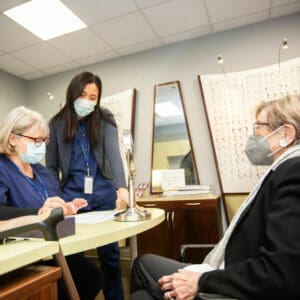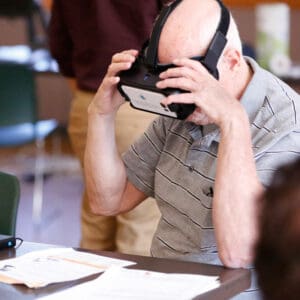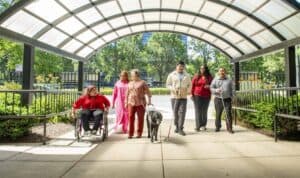What is Low Vision?
Having permanently reduced vision makes it difficult to perform everyday tasks, such as reading or watching television. If regular glasses, contact lenses, medicine and/or surgery cannot further restore your vision, you may benefit from vision rehabilitation.
Low Vision at a Glance
- Cannot be corrected with glasses, surgery, or medication.
- It can affect anyone, but is most common in people age 65 and older.
- Cannot be reversed, but it can be managed.
What are the Types of Vision Loss?
Here are common eye diseases that may result in significant vision loss:
Central Visual Field Loss
 Characterized by difficulty seeing straight ahead clearly; limited ability to read, drive a car, or recognize details. Caused by diseases including:
Characterized by difficulty seeing straight ahead clearly; limited ability to read, drive a car, or recognize details. Caused by diseases including:
-
-
-
-
- Cone-Rod Dystrophy
- Diabetic Retionopahy
- Macular Degeneration
- Stargardt Macular Dystrophy
-
-
-
Peripheral Visual Field Loss
 Characterized by narrowing of visual field; often referred to as tunnel vision. Caused by diseases including:
Characterized by narrowing of visual field; often referred to as tunnel vision. Caused by diseases including:
-
-
-
-
- Glaucoma
- Hemianospia/Stroke
- Retinitis Pigmentosa
-
-
-
Reduced Acuity, Contrast & Glare
 Characterized by difficulty distinguishing an object or shape from its background. Caused by diseases including:
Characterized by difficulty distinguishing an object or shape from its background. Caused by diseases including:
-
-
-
-
- Achrinatiosuam
- Albinism
- Aniridia
- Cataracts
- Corneal Dystrophiles & Degeneration
- Myopic Degeneration
- Nystagmus
- Optic Nerve Hypoplasia
- Optic Atrophy
-
-
-
Did you know that diabetes is the leading cause of preventable blindness?
Diabetic eye disease often shows no warning signs. Regular eye screenings are a vital part of preventative diabetes care, and you can now schedule a diabetic eye screening at The Chicago Lighthouse’s Low Vision Clinic. Screenings are quick and do not require dilation drops.
To schedule a diabetic screening, please call
(312) 997-3686 during regular business hours.
I am experiencing vision loss – what should I do?
 Understand Your Condition
Understand Your Condition
Consult with a low vision optometrist for a comprehensive exam to learn more about your specific eye condition. After the exam, you will receive an individualized rehabilitation plan that may include recommendations for vision devices and technology.
 Maximize Remaining Vision
Maximize Remaining Vision
There are many tools and techniques that can help you maximize your remaining vision. If you are having trouble with everyday tasks, such as reading, shopping, or watching TV, assistive technology can help. One great resource is the Tools for Living Retail Store, which offers everything from electronic magnifiers to adapted toys and cookware to help people of all ages function independently and get back to doing what they love.
 Adapt to Life With Vision Loss
Adapt to Life With Vision Loss
Vision loss can impact every aspect of your life, including your mental well-being. Speak with a mental health professional about the emotional and behavioral challenges you may be facing due to vision loss. Services such as occupational therapy, orientation and mobility training, and vocational rehabilitation will help you adapt to everyday life and maintain your independence.
There are many advances being made in low vision treatment. The Chicago Lighthouse’s research team is currently working on initiatives, including:
- Clinical trial of an Intracortical Visual Prosthesis, a group of wireless implants that may restore some light perception for people who are blind.
- Diabetes Prevention Program, a free, year-long program committed to reducing rates of diabetic eye disease, which is the leading cause of preventable blindness.
Q&A: What should I know about low vision?
Q: What is low vision?
A: Low vision is defined as having impaired vision that cannot be corrected by glasses, surgery or medication.
Q: What are the most common causes of low vision?
A: Macular degeneration, an age-related disease that affects the central vision portion of the visual field, is the most common cause of low vision. Other common causes include diabetes, cataracts, and glaucoma.
Q: How prevalent is low vision?
A: Approximately 4 million Americans live with low vision. By 2050, the number of people with vision impairments or blindness in the U.S. is expected to double to more than 8 million.
Q: Who is at risk of low vision?
A: People of all ages can be at risk of vision loss, but it is most common in people who are 65 or older.
Q: How does low vision impact your life?
A: Low vision can impact your daily life and mobility, but there are many options available to maximize your remaining vision.
Q: Can you live independently with vision loss?
A: YES! There are many low vision rehabilitation services and resources that will help you to maximize your remaining vision loss so that you can adapt to life and continue to do what you love.
Q: How can you stay on top of your eye health?
A: Many eye diseases have no symptoms in their initial stages, so early detection is vital for preserving further vision loss. Receiving annual eye exams can help you to stay on top of your eye health.
Q: Where can I find comprehensive low vision services?
A: The Chicago Lighthouse’s Sandy & Rick Forsythe Center for Comprehensive Vision Rehabilitation Care can help you maximize your remaining vision so that you can continue to live independently and do the things you love. We are dedicated to providing superior vision rehabilitation services to people with all levels of vision loss. Our comprehensive approach to low vision care integrates multidisciplinary services to help patients better understand their condition and adapt to life at all stages of vision loss. We never turn anyone away due to inability to pay.
The Chicago Lighthouse’s comprehensive services include:
- Low Vison Optometry
- Occupational Therapy
- Assistive Technology
- Psychological Support
- Clinical Research
- Orientation & Mobility Training
“You can live and thrive with vision loss. There are many ways that to improve your function, independence, and overall well-being. There is always something that can be done.”
– Dr. Kara Crumbliss, Optometrist & Vice President of Clinical Services at The Chicago Lighthouse
The Chicago Lighthouse is a social service agency serving the blind, visually impaired, disabled and Veteran communities. No one is turned away due to inability to pay. To make a donation, click here.
Keep updated on topics and advancements in the field of low vision. Follow us on social media:
Facebook | Twitter | Instagram | Website
February is Low Vision Awareness Month. Share this page to spread the word about low vision.


